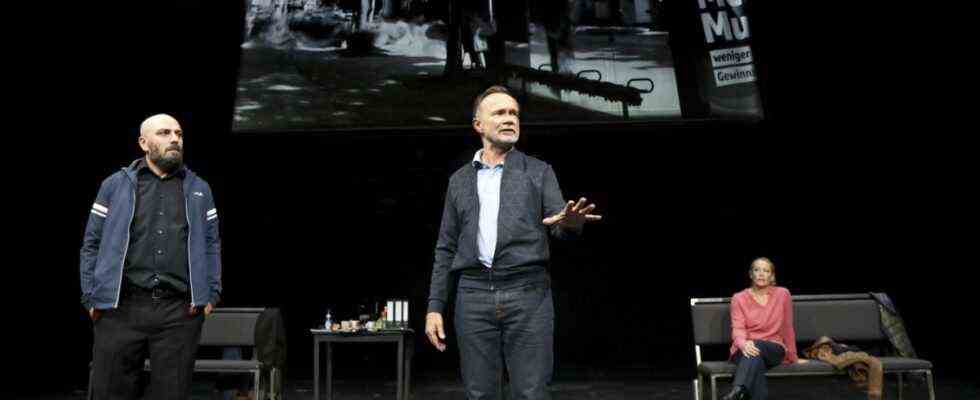At the end you can see the murdered man’s brother in the video. Gavriil Voulgaridis would have liked to have played in this production, but since this is now part of the repertoire of the Munich Residenztheater and the many performances are difficult to reconcile with the life of a non-actor, there is this makeshift, recorded a few weeks ago. Voulgaridis tells of his impression of the outcome of the NSU trial, of the fact that they, the relatives of the victims, had been promised complete clarification and that so much was still open that a black cloud hung over the decades of his life in Germany. “We just want to live here in peace.”
Between 2000 and 2007, the NSU murdered ten people in Germany, and in 2011 two members of the criminal trio were blown up in their mobile homes. At the latest then it became obvious what many authorities, investigators, the judiciary and the police did not want to admit for a long time: that there had been a series of racist and neo-Nazi motivated murders in Germany. In 2014 the director Christine Umpfenbach was one of the first to react to this and brought out her play “Judgment” in the royal stables of the Residenztheater, written and researched by her and Azar Mortazavi. It was a play about the victims, their families, friends, relatives.
The director built trust among the bereaved
On July 11, 2018, the NSU trial at the Munich Higher Regional Court ended after 438 days. A judgment has been made, but little has been dealt with. Reason for Christine Umpfenbach to revise her piece. “Judgments (revisited) – After the trial” is three-quarters based on the material from 2014, arose in many conversations with the bereaved, in which Umpfenbach carefully built up the trust that they had lost after their experience with police interrogations and sensation-hungry reporters. A quarter is new, reflects the process and the consequences. The disappointment of the lawyers, the brother, the widow’s friend.
“Judgments (revisited)” is a perfect report, which fits into the staging of the Marstallbühne and illuminates many aspects. Its premiere is in a broad context, that of the festival “Keinschlussstrich”, which takes place from October 21st to November 7th in 15 German cities. In all the cities in which the NSU murdered, in which it constituted itself and later went into hiding. Especially in those where the victims lived. Jonas Zipf, who came to Theaterhaus Jena in 2011 and has been the city’s head of culture since 2015, who, before taking office, made it clear to the city where the core trio of the NSU was born that there would certainly be an NSU project during his term of office, gave the impetus. 18 institutions in 15 cities joined forces, founded a sponsoring association and received federal funding.
One thing unites the theaters: They focus on the victims
The festival is too diverse to even begin to reproduce the program here. One thing unites the many houses, most of which contribute new productions: the focus is on the victims. And the many questions that are still open after the verdict. Two projects summarize the individual locations: The exhibition “Open Process”, which can be seen in all participating cities, and the oratorio “Manifest (o)”, a modular composition in seven parts, of which individual performances take place in all 15 cities and three integral performances in Jena and Nuremberg, in which the parts from other cities that are not performed live are switched on via video. The German-Turkish recruitment agreement for guest workers was passed 60 years ago, and the NSU was exposed ten years ago. That shows the whole ambivalence of the anniversaries that gave rise to the timing of “No line!” form now.
On August 29, 2001, Habil Kiliç was shot dead in his grocery store on Bad-Schachener-Strasse in Munich-Ramersdorf. On June 15, 2005, the perpetrators of the NSU executed Theodoros Boulgarides (the different spelling of his and his brother’s surname can be found in the program) at the counter of his newly opened locksmith in Trappentreustraße in Munich’s Westend. Umpfenbach does not hide the other eight victims, but their performance revolves around Boulgarides and Kiliç, their friends, relatives and colleagues. Three members of the ensemble, Myriam Schröder, Delschad Numan Khorschid and Thomas Reisinger are Umpfenbach’s representatives for the many characters whose words they reproduce. Your game remains open, there are, with a few costume pieces, small adaptations that ultimately only increase the plasticity; the three do not become the characters they represent here on stage, they stand for them.
A little dark string music by Azhar Naim Kamal separates the scenes, nothing more is needed to suggest the character of a requiem. Above the play area, two photos of the streets in which the murders took place alternate, everyday scenes, sometimes coarse-grained, sometimes incorrectly exposed, almost no color, but a strange shimmering, as if a ghost were pulling through.
A tableau emerges, a relief that you believe you can grasp with your hands. The endless, recurring interrogations, her husband had a lover, life insurance, and he sold drugs. Murder investigations certainly always begin in the immediate vicinity. But it was more than ten years after the first murder that anyone wanted to see the real story. One learns of everyday racism, the – stunned – institutional racism of certain authorities, the failure of the protection of the constitution, the silence of the informants, from tabloid journalists who invented the “kebab murders”, from completely disappointed lawyers. The then head of the investigation called the family when the truth could no longer be overlooked. It was the only excuse. Many injured lives remained.

